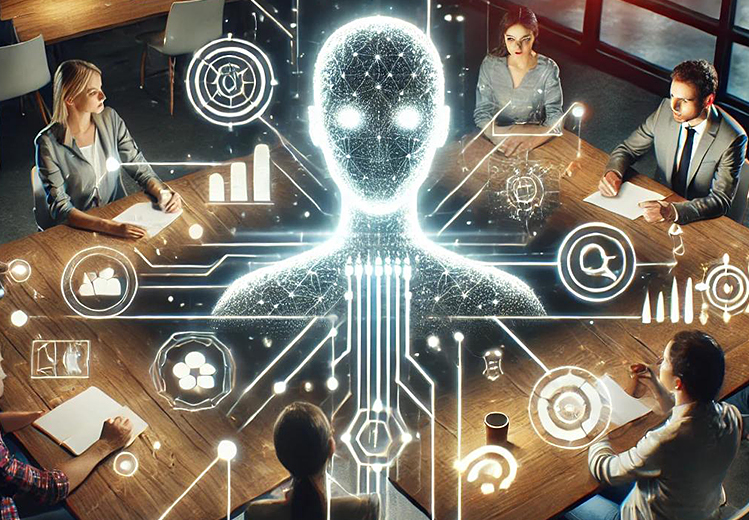Simple self-operating systems, like AI bots, enhance group creativity by encouraging coordinated idea exploration.

Illustration of AI-human interaction for enhancing group creativity. The image was generated by ChatGPT (OpenAI).
Innovation and creativity are crucial for solving complex problems, but finding the best ideas can be challenging. While groups often generate more innovative solutions than individuals, they also face obstacles like groupthink, where everyone quickly agrees on less-than-ideal ideas. A recent study by Atsushi Ueshima, Matthew I. Jones, and Nicholas A. Christakis explores how simple AI agents, or 'bots,' can enhance group creativity by improving collaboration and discovery processes [1].
Reflecting on his motivation for this research, Ueshima explains that his focus wasn't primarily on "creativity" itself, but on developing experimental methods with real-world applications, as he noted that "traditional social psychology research had not fully achieved such outcomes." This study represents a blend of his interest in refining methodologies and the principal investigator's focus on creativity.
In the experiment, participants played a word search game, navigating a space of 20,000 words, each assigned a hidden point value. The goal was to find the word with the highest points. Some played solo, while others were in groups connected through a social network. To test the effectiveness of bots, two types were introduced: one that shared words based on similarity to human selections and one that shared more diverse, dissimilar words.
The idea was straightforward: Could these bots enhance the group's ability to explore the word space and discover the best ideas? These "bots" are simple computer programs designed to perform tasks automatically, like virtual assistants that help with repetitive actions such as searching for information, with minimal human input.
Key Findings
Groups vs. Individuals: Groups outperformed individuals by pooling knowledge and exploring more options, confirming the advantage of collaboration.
Role of Bots: Bots that suggested words most similar to human selections provided the most significant benefit, gently steering groups toward better solutions without overshadowing the creative process. These bots were especially effective in simpler decision-making scenarios.
Balancing Creativity: The study suggests that balancing similarity in ideas is key. Too much similarity can stifle creativity, while too much diversity can overwhelm the group with scattered ideas.
The importance of this research lies in showing that simple AI bots can positively influence group creativity without being overly complicated or intrusive. Bots help encourage fresh ideas. Moreover, this work highlights the broader potential of AI-human collaboration, demonstrating that even basic AI interventions can enhance group performance in creative tasks. These findings may have real-world implications across various fields, such as product development, organizational problem-solving, and collaborative scientific research.
Published online 15 November 2024
About the researcher

Atsushi Ueshima ― Assistant Professor
Faculty of Letters
Atsushi Ueshima received his Ph.D. in Social Psychology from the University of Tokyo in 2021. After working as a postdoc at Tohoku University and Yale University, he joined Keio University as an Assistant Professor in 2024. His research interests lie in social psychology, particularly in areas such as decision-making, social norms, justice, and collective intelligence.
Links
Reference
- Ueshima, A. et al. Simple autonomous agents can enhance creative semantic discovery by human groups. Nat. Commun. 15, 5212 (2024) . | article